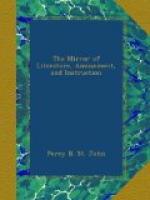[5] Stow’s “Annals.”
[6] Holinshed’s “Chronicle,” vol. iii. p. 765, edit. 1808.
[7] “Collectanea,” vol i. p. 70.
[8] Tanner.
S.I.B.
* * * * *
ANCIENT OATHS.
(To the Editor of the Mirror.)
It will be recollected, that in a former volume I gave you the form of the oath taken by the appellee in the ancient manner of trial by battle. The appellee, when appealed of felony, pleads not guilty and throws down his glove, and declares he will defend the same by his body; the appellant takes up the glove, and replies that he is ready to make good the appeal body for body; and thereupon the appellee, taking the book in his right hand, makes oath as before mentioned. To which the appellant replies, holding the Bible and his antagonist’s hand in the same manner as the other, “Hear this, O man, whom I hold by the hand, who callest thyself Thomas by the name of baptism, that thou art perjured; and therefore perjured, because that thou feloniously didst murder my father, William by name. So help me God and the Saints, and this I will prove against thee by my body, as this court shall award.” And then the combat proceeds.
There is a striking resemblance between this process and that of the court of Arcopagus, at Athens, for murder, where the prisoner and prosecutor were both sworn in the most solemn manner—the prosecutor, that he was related to the deceased, (for none but near relations were permitted to prosecute in that court,) and that the prisoner was the cause of his death; the prisoner, that he was innocent of the charge against him.
In time I hope to be able to furnish you with other specimens of our curious ancient oaths.
W.H.H.
* * * * *
SONNET.
(For the Mirror.)
Whose heart is not delighted at the sound
Of rural song, of Nature’s
melody,
When hills and dales with harmony rebound,
While Echo spreads the pleasing strains
around,
Awak’ning pure and heartfelt
sympathy!
Perchance on some rude rock the minstrel
stands,
While his pleased hearers
wait entranced around;
Behold him touch the chords with fearless
hands,
Creating heav’nly joys
from earthly sound.
How many voices in the chorus rise,
And artless notes renew the
failing strains;
The honest boor his vocal talent tries,
Approving love beams from his “fair
one’s eyes,”
While age, in silent joy,
forgets its pains.
J.J.
* * * * *
THE DEATH OF SALADIN.[9]
[9] For the particulars of which, see Knolle’s “history of the Turks.”




